Abstract
This paper examines the work values of white-collar workers in the United States and the Philippines. It compares the extrinsic and intrinsic motivating factors and describes the core work motivators. Despite divergence in culture, economic environment, and level of industrialization, the results indicate that intrinsic factors are similarly effective for both groups while the effectiveness of extrinsic factors are more culturally determined.
Similar content being viewed by others
References
Best, F. 1985. “The Workforce of Tomorrow.”Personnel Journal January: 40–41.
Brody, M. 1985. “Meet Today's Young American Workers.”Fortune November 11: 90–98.
Cooper, M. R., et al. 1979. “Changing Employee Values: Deepening Discontent?”Harvard Business Review January: 117–25.
Harris, P. R., and R. T. Moran. 1987.Managing Cultural Differences. Houston: Gulf Publishing Company.
Herzberg, F. 1968. “One More Time: How Do You Motivate Employees?”Business Review January–February: 53–62.
Herzberg, F. 1987. “Workers' Needs: The Same Around the World.”Industry Week 234. September 21: 29–39.
Hofstede, G. 1984.Culture's Consequences and International Differences in Work-Related Values. Beverly Hills, CA: Sage Publications.
Jackofsky, E., J. W. Slocum, Jr., and McQuaid. 1988. “Cultural Values and the CEO: Alluring Companions?”The Academy of Management Executive 2.1: 39–49.
Kanter, R. M. 1978. “Work in America.”Daedalus. 47–74.
Kanungo, R. N., and R. W. Wright. 1983. “A Cross-Cultural Comparative Study of Managerial Job Attitudes.”Journal of International Business Studies 14: 115–29.
Lawler, E. E. 1973.Motivation in Word Organizations. Belmont, CA: Wadsworth.
Maslow, A. H. 1954.Motivation and Personality. New York: Harper and Row.
Raines, R., B. Burkholder, and D. Suseno. 1988. “Changing Expectations in the Workplace.” Unpublished paper, May.
Ronen, S., and A. I. Kraut. 1977. “Similarities Among Countries Based on Employee Work Values and Attitudes.”Columbia Journal of World Business 12: 89–96.
Webber, R. A. 1969, May–June. “Convergence or Divergence.”Columbia Journal of World Business 4: 75–83.
Whitely, W., and G. W. England. 1977. “Managerial Values as a Reflection of Culture and the Process of Industrialization.”Academy of Management Journal 20.3: 439–53.
Yankelovich, D., and J. Immerwahr. 1983.Putting the Work Ethic to Work: A Public Agenda Report on Restoring America's Competitive Vitality. New York: The Public Agenda Foundation.
Yankelovich, D., et al. 1985.The World at Work: An International Report on Jobs, Productivity and Human Values. New York: Octagon Books.
Author information
Authors and Affiliations
Rights and permissions
About this article
Cite this article
Sotto, F.C., Kohls, J.J. White-collar work values and attitudes: A cross-cultural comparison of the U.S. and the Philippines. Int J Value-Based Manage 3, 21–35 (1990). https://doi.org/10.1007/BF01732411
Issue Date:
DOI: https://doi.org/10.1007/BF01732411




